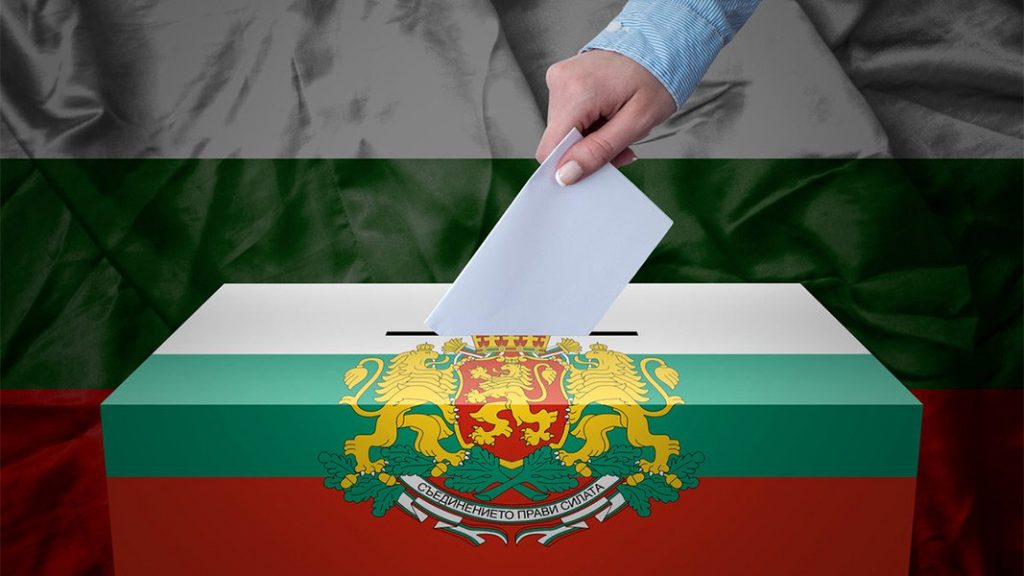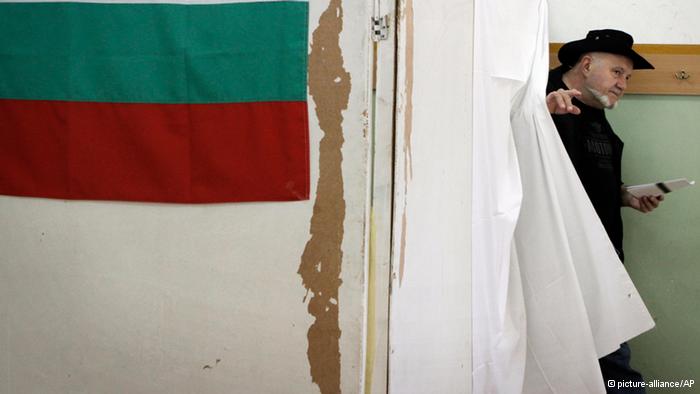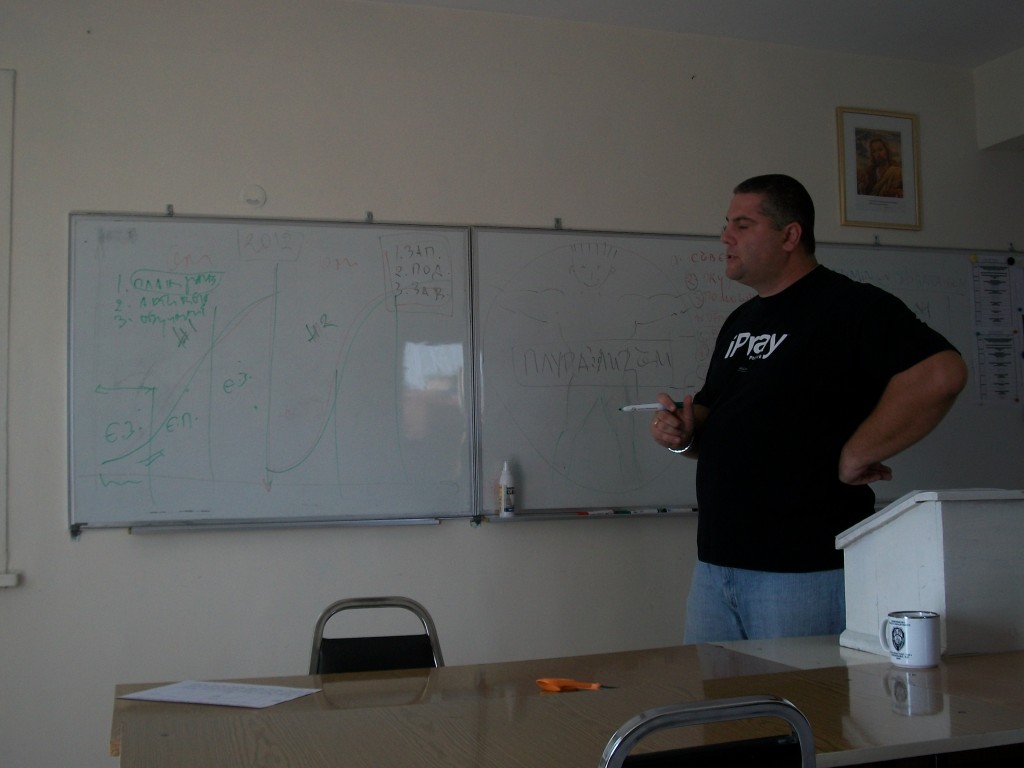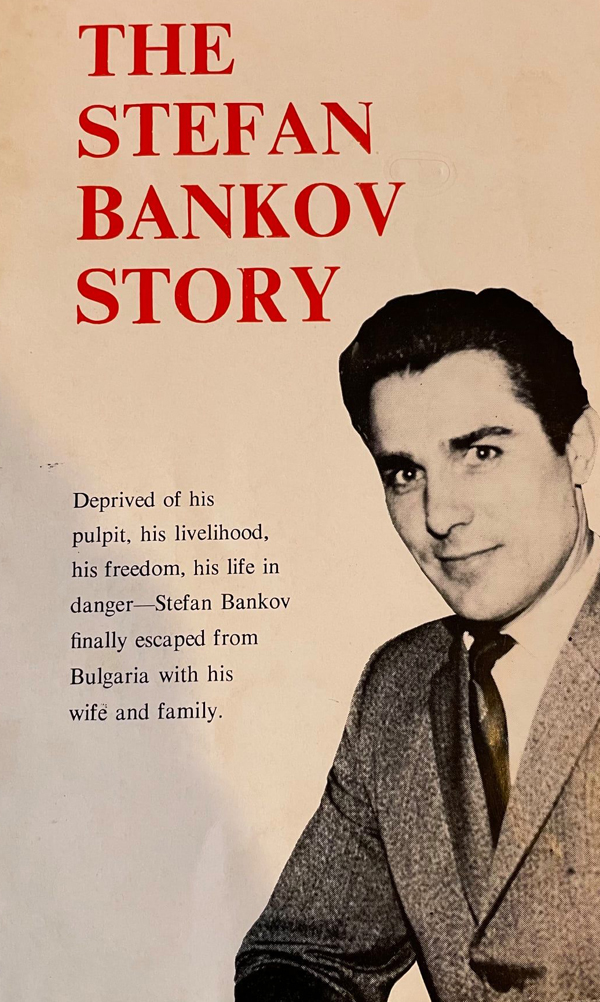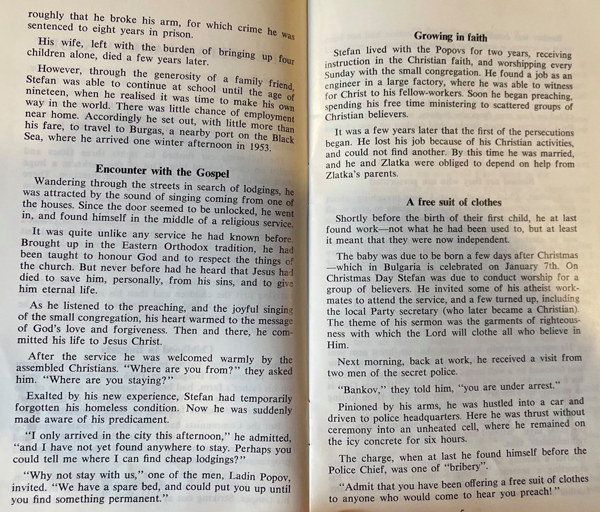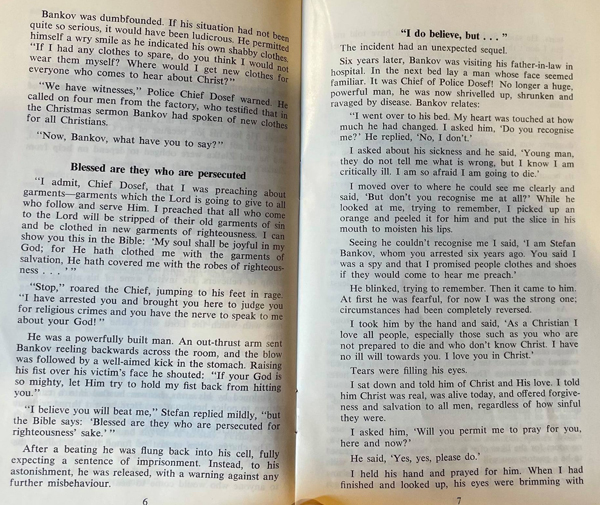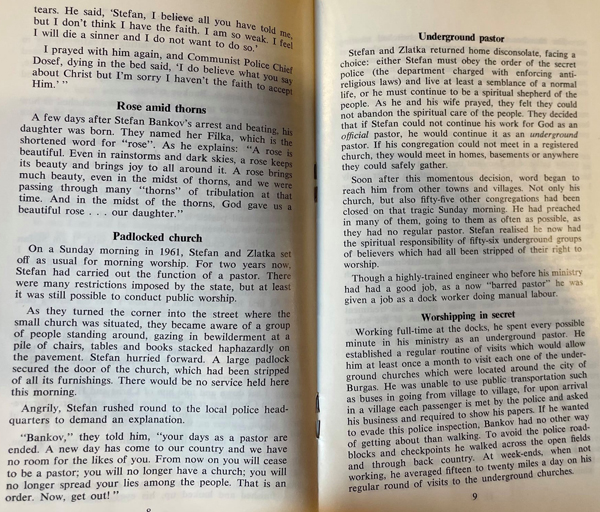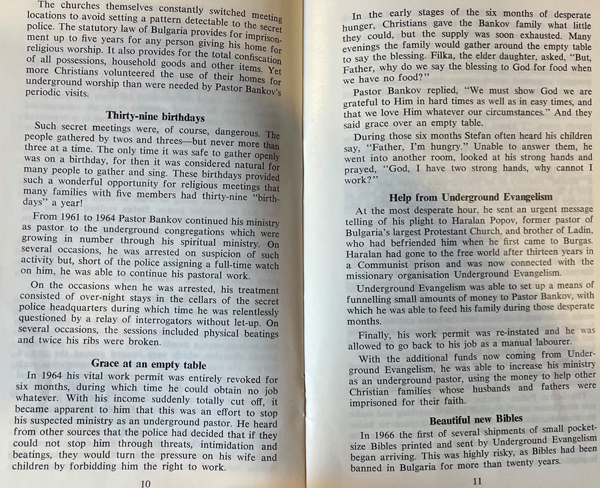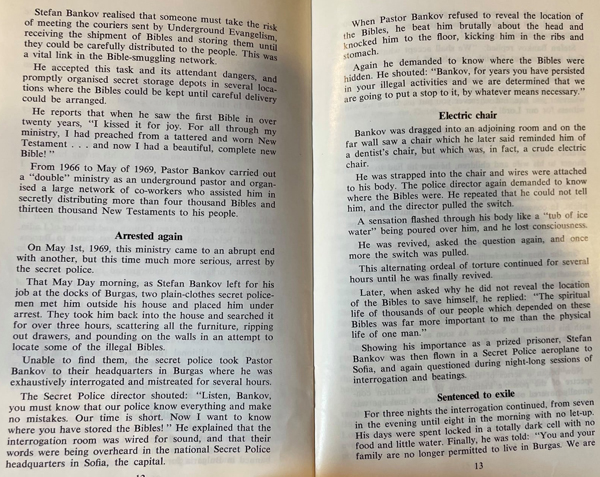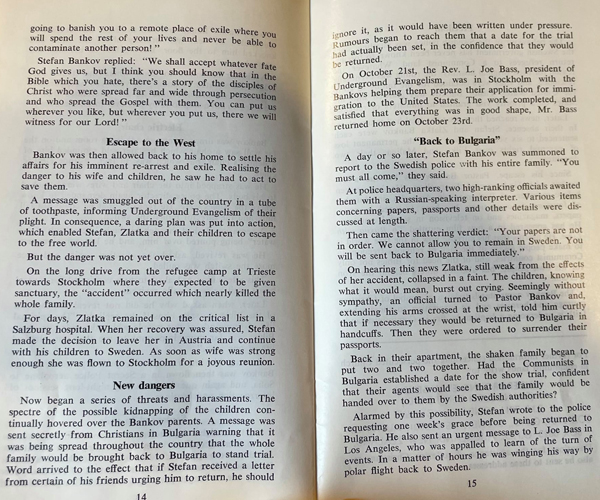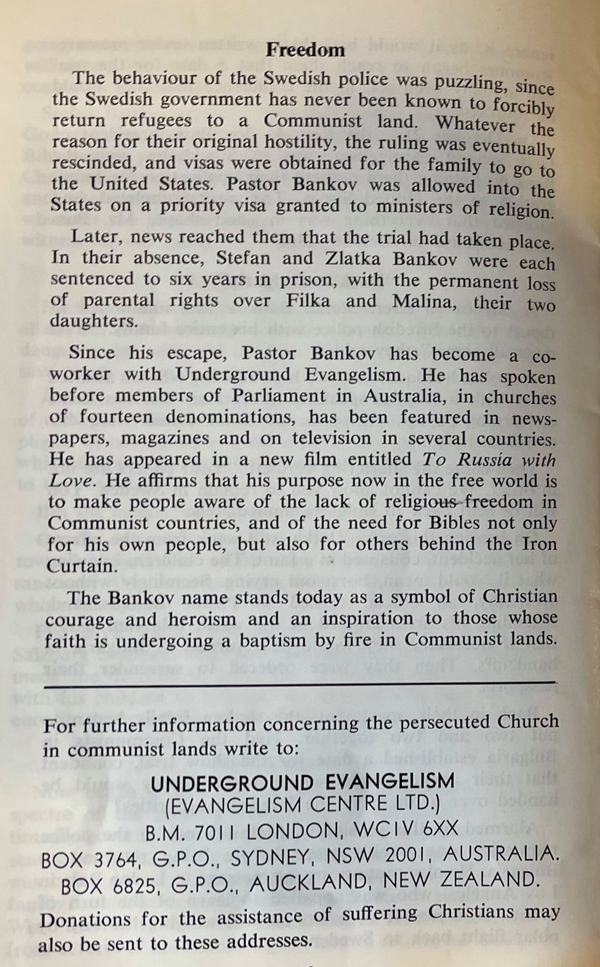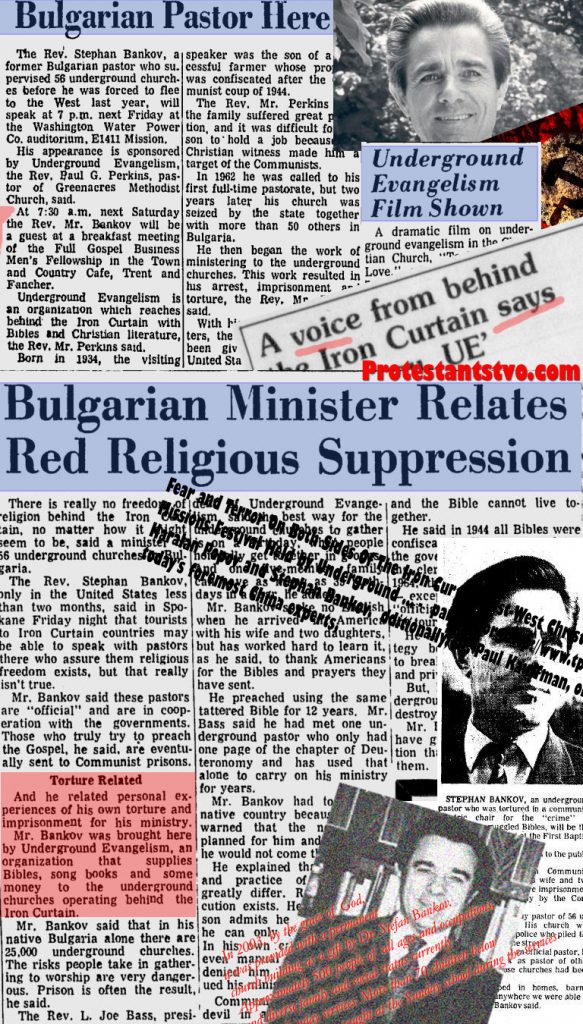Third National Elections for 2021 in Bulgaria
November 10, 2021 by Cup&Cross
Filed under Featured, News, Publication
This weekend, Bulgaria is holding another, third national elections for 2021. This one has a double outcome – new parliament and a new president. After not being able to form a government in the first two elections for 2021, the country is heading to a major political storm within the growing pandemic. Apart from struggling economically with other EU countries, Bulgaria is currently leading with death cases due to COVID and the temporary acting government has been hopelessly drifting between strong restriction measures of virtually all business and gatherings or a complete lock-down for weeks at the time. None of these has brought any desired results.
On the contrary, virtually all evangelical churches are struggling to respond to the needs of their congregations pressed between the harsh restrictions and keeping the lights on as commercial electricity cost has increased over 33% this year alone. While the Eastern Orthodox church in Bulgaria is subsidized with some $10-25 million and the Muslim confession with $3 million, the evangelical churches are only hoping to get some grants after this year’s national census is counted. By accepting state subsidy, however, religious groups in Bulgaria are entering a season of dependence on secular government. For the evangelicals this means:
- Churches and ministers must declare all foreign currency money flow and foreign bank accounts
- Participation of foreign persons in the administration of any denomination is strictly forbidden
- Foreign parsons shall not be allowed to speak at religious meetings in any way shape or form especially religious sermons
- Anonymous donations and donorship to religious organization is not permitted
- Bulgarian flag shall be present in every temple of worship
- The new measure will block all foreign interference in the faith confessions and denominations in Bulgaria
As if all this is not enough, just a week before the elections it was revealed that the electronic vote this time will be done on voting machines purchased from nowhere else but Venezuela. Over 400 such machines have been brought into the country without registration “for spare parts,” which brings even more confusion and suspicion to the already fragile election process that has occurred in Bulgaria almost every year since 2005.
Government Elections in Bulgaria (2005-2022):
2005 Parliamentary Elections
2006 Presidential Elections
2007 Municipal Elections
2009 Parliamentary Elections
2009 European Parliament elections
2011 Presidential Elections
2011 Local Elections
2013 Early parliamentary elections
2014 Early Parliamentary Elections
2015 Municipal Elections
2016 Presidential election
2017 Parliamentary elections
2019 European Parliament election (23-26 May)
2019 Bulgarian local elections
2019 Municipal Elections
2021 March National Parliament election
2021 Second National Parliament election
2021 Third National Parliament and Presidential elections
Bulgaria: What to Watch for in the November 14 Elections
Although the third for the year, on November 14 for the first time the elections will be 2 in 1 – for president and MPs. The vote is taking place at the peak of the fourth wave of coronavirus in Bulgaria and anti-epidemic measures will again be observed, and the number of those who voted with a mobile ballot box will be clear on election day.
For the second time, the voting in the sections with 300 and more voters will be only with machines, but for both votes the voting procedure will be with one device, and it will be necessary to indicate what to vote for and wait for the printing of two receipts. Therefore, it is expected that the process will be slower, and if the cases of patients in the coming days increase – this will affect the turnout.
In front of the voters
The third election of the year will be held at the peak of the fourth wave of the coronavirus epidemic, which may be a cause for concern among some eligible voters. For now, there will be no stricter anti-epidemic measures in the polling stations and they will remain known until now – wearing masks, disinfection, distance and frequent ventilation in the premises. From the previous two votes it cannot be concluded that the incidence will be denied by voters, as on April 4, when the peak of the third wave was, voter turnout was 50.61%, while on July 11, when there were few registered cases – only 42.19% .
Quarantined voters will be able to ask to vote with a mobile ballot box at the address where they are isolated, even on election day. It would be an obstacle if by the day of the vote in a given settlement there is no section for quarantined, as a condition to have only 10 applications submitted before. However, the Central Election Commission did not know whether it would be possible to open so many quarantined sections in recent weeks.
For the first time this year, the elections will be 2 in 1 – for president and MPs, which could lead to delays and queues in some sections. In the sections with 300 and more voters, the voting is only with machines, and the voting time is expected to be 5 minutes again.
There are two points that a voter using a device should be aware of. The first is at the beginning, when the machine asks which type of election the voter wants to vote for and whether for both – he/she can mark once and by continuing, confirm, after which he/she has no right to correction. The second is when printing the segments with the choice at the end – if the voter has exercised his/her right to vote in both votes, he/she must wait for the machine to print two receipts – one short and one longer, and pull them out after hearing a beep. If it does so while printing, the machine may lock.
The voter will also have a problem if he/she decides to take pictures of how they vote, as the recording of the vote is prohibited and the sanction is BGN 1,000.
Possible problems for the election commissions
There seem to be two main challenges for sectional election commissions – one is related to the machines and the other is to the counting of the voting receipts.
The problems with the machines can be of different nature – technical malfunctions, errors in the lists as on April 4 in Veliko Tarnovo, when there were exchanged names and numbers in one of the candidate lists, errors in cleaning, which can only be done with alcohol, etc. . A technician will be available, but if the fault is not rectified, a paper ballot will be put to the vote following a decision by the district or central commission.
Difficulty and delays in reporting the results would be caused by the decision to count all machine voting receipts, which were taken by the Central Election Commission but revoked by the Supreme Administrative Court. The commission should now determine in how many and in which sections the control receipts should be counted, and the result will be taken from the protocol printed by the machine, and the result of the control count will not be entered in the protocol.
However, the count will slow down the section commissions where it is done. After the end of the election day, the commissions will have to open the box with the receipts, divide into two piles those for the presidential and those for the parliamentary vote and then count, without taking into account the preferences for MPs. According to experts, voluntary or unintentional human errors are possible during the counting, as well as manipulations by destroying part of the receipts. This will certainly delay the transmission of the results to the district election commissions.
Pentecostal Education in Bulgaria Two Decades Later
This article was originally authored in 2008 and now addresses issue that have been ongoing for over 20 years
The missionary strategy of Protestant denominations toward Bulgaria within the 19th century effectively included evangelistic, publishing and educational outreaches. The educational paradigms, which the western missionaries introduced, were soon adopted by the Bulgarian people, quickly realized as progressive and successfully implemented in both religious and secular Bulgarian schools. These trends continued in the next several decades, educating Bulgarian youth and producing the first generation of Bulgarian leaders who took their rightful place in political, economical, social and religious structures in the Bulgarian lands.
Unfortunately, when the Communist Revolution took place in Bulgaria, all religious schools, with the exception of the Eastern Orthodox Seminary in Sofia, were closed down and religious education was outlawed. For the next half century, Bulgarian evangelical ministers were destined to do ministry without any former religious education.
When the Berlin Wall fell in 1989, the tension for religious education reached its culmination and a number of religious schools were quickly established across Bulgaria. The instruction methods used ranged from Bible study home groups to Bible colleges all to fulfill the niche for religious education. Two important milestones must be mentioned here, and they are the opening of the Logos Bible Academy in the Danube town of Russe and the starting of a long distance program by ORA International.
Naturally, the general trend of Bulgaria’s post communist governments to control these educational institutions resulted in the registration of a religious institute under the Directorate of Religious Affairs, a government agency formed to register, manage and supervise the activity of religious formation on the territory of Bulgaria. It was in this context that the Bulgarian Evangelical Theological Institute (BETI) was formed and registered in the capital Sofia. It included five departments (often called faculties), representing Bulgarian evangelical denominations with a predominant focus on the Pentecostal wing.
The Theological College in Stara Zagora, often mistakenly called a Theological Seminary, was established in 1998 as one of these departments to represent the Bulgarian Church of God. Because of current developments within the Bulgarian Church of God, the department was started in the city of Stara Zagora, located some four hours east of the capital and became the only of the faculties not located in Sofia. Naturally, its location, staff, affiliation and purpose created a sense of independence, both in its theology and structure.
With the acceptance of the new Act of Confessions in 2002, the Bulgarian government employed a more drastic approach toward all religious institutions not fitting the standard denominational profile. Since BETI was among them, the government initiated the process of the Institute’s accreditation with the Ministry of Education. Five years later, the government is yet to grant the accreditation. It was not until the publication of this article in March, 2008 that the Bulgarian Government moved toward finalizing the long-awaited accreditation of BETI.
Meanwhile the Institute’s management is facing a tri-dimensional dilemma which includes economic, cultural and leadership tensions. Some of them have not been resolved due to the lack of recourses; others have not been resolved due to the lack of essential prerequisites in the long-term educational strategy of the school. The following is a list of the challenges, which must be resolved immediately in order for the Institute to continue to operate under the said government accreditation:
1. The school’s baccalaureate program, structured primarily after 20th century American Bible college model, is practically incompatible with the requirements of the Bulgarian Ministry of Education. The dilemma of changing the program to meet the accreditation requirements or to retain the school’s evangelical identity is yet to be resolved on part of BETI as a whole, as well as its theological departments individually.
2. Three masters programs that were to focus on the subjects of Christian counseling, chaplaincy ministry and missions were secured from the Bulgarian government several years ago. However, because of the lack of students and experts on the said topics, only one of them, the master’s program in counseling, has been partially developed. Today, it remains in its initial phase as a distance-learning program, while the other two programs are virtually untouched.
3. It has taken BETI over a decade to comply with the country’s requirements for higher education. In this process, the school has not facilitated the opportunity for religious master’s programs thus missing its mission to become a higher education authority in religious studies.
4. The resistance toward the evangelical movement and more specifically its presence within the educational process of Bulgarian adolescents has resulted in continuous protests on part of the Bulgarian community. They have been followed by restrictions from the government, which has forced the Institute at the periphery of the educational process. Two waves of attacks against Bulgarian evangelicals in 1990-1993, 2002-2004 and the current trend of the government to establish mandatory religious classes for children ages seven to twelve has contributed to this alienation and has forced the inability of evangelical education to find and establish its place within the Bulgaria community. Much of this has to do with the lack of an adequate placement strategy for graduates upon the completion of the college’s program.
5. Furthermore, scholarships for individual students and sponsorship for the colleges of the Institute has weekend since 9/11 creating an economical dilemma with which the Institute is still struggling. The financial crisis has brought about the rethinking of the economic strategy of the Institute, its dependency on religious support sources and its financial self-sufficiency.
6. Additionally, a number of Roma/Gipsy communities have received substantial educational grants from the European Union upon Bulgaria’s official membership. This has taken a great number of the Roma/Gipsy students within the Institute in a different direction.
7. Immigration has also taken its toll on the Institute’s graduates, as many of them have seized the opportunity to continue their training in religious educational institutions abroad, while other have simple forgone their higher religious education in the struggle for personal survival, both groups never to return and practice in Bulgaria.
8. It is also unfortunate, that most of the professionally trained Bulgarians who have graduated with a higher degree in religious studies from foreign colleges and universities, have been unable to find their place within the structure of the BETI and have been employed in educational institutions, religious centers, ministries and missions which often have to do very little with Bulgaria.
9. The denominational affiliation of each of the departments, has contributed to the dilemma of structural incompatibility with the leadership and vision differences between the denominations that are affiliated with the Institute. The recent crises in several of the member dominations have added to the escalation of the above dilemmas and the incapability for the resolution from a denominational standpoint.
10. Naturally, the well-educated graduates have chosen not to occupy themselves with denominational politics both to avoid confrontation and to express their disagreement. This dynamic has been partially ignored by leadership remaining from the period of the underground church when religious education was virtually nonexistent and lacking a complete realization of the power of education. This unnoticed trend, however, endangers Bulgarian Evangelism creating a lack of continuity within the leadership and preparing the context for the emerging leadership crises.
As an educational institution of the Bulgarian Church of God and a member of the Bulgarian Evangelical Theological Institute, the Theological College in Stara Zagora has experienced all of the above dilemmas and more. Its physical distance from the capital Sofia has jeopardized its accreditation with Bulgaria’s Ministry of Education, the latest guidelines of which have constituted that a school department cannot be more than 25 miles away from its main office. Since Stara Zagora is almost 200 miles away, the Church of God Bible College has been forced to find a suitable alternative. One logical solution may be to move the school or parts of the school to a Sofia location.
However, the Stara Zagora Theological College has had very little if any representation in the capital for its decade of existence. A move to Sofia would propose a number of new problems such as the relocation of teachers and a forced split of focus between two campuses. Another immediate challenge would be the development of a long-term financial strategy to meet a budget, which in the capital would be three-four times the cost of the same operation in the city Stara Zagora. And finally, a successful strategy for establishing a new level of cooperation with the rest of the Institute’s departments, which have operated in the capital Sofia for over a decade is a must, before a successful educational program can be initiated by the Bulgarian Theological College at the new location.
Global Network of Bulgarian Evangelical Churches outside of Bulgaria (2021 Report)
 Bulgarian Evangelical Churches in the European Union (2019)
Bulgarian Evangelical Churches in the European Union (2019)
- Bulgarian Evangelical Churches in Germany
- Bulgarian Evangelical Churches in Spain
- Bulgarian Evangelical Churches in England
- Bulgarian Evangelical Churches in France
- Bulgarian Evangelical Churches in Belgium
- Bulgarian Evangelical Churches in Italy
- Bulgarian Evangelical Churches in Cyprus
- Bulgarian Evangelical Churches in Crete
Bulgarian Evangelical Churches in America (2019 Report)
- Bulgarian Evangelical Churches in Chicago (2019 Report)
- Bulgarian Evangelical Churches in Texas (2019 Report)
- Bulgarian Evangelical Churches – West Coast (2019 Report)
- Atlanta (active since 1996)
- Los Angeles (occasional/outreach of the Foursquare Church – Mission Hills, CA)
- Las Vegas (outreach of the Foursquare Church – http://lasvegaschurch.tv)
- San Francisco (occasional/inactive since 2012, Berkeley University/Concord, CA)
Bulgarian Evangelical Churches in Canada (2019 Report)
- Toronto (inactive since 2007)
- Toronto/Slavic (active since 2009)
- Montreal (occasional/inactive since 2012)
CURRENTLY INACTIVE CHURCHES/CONGREGATIONS:
- New York, NY (currently inactive)
- Buffalo, NY (occasional/inactive)
- Jacksonville, FL (occasional/inactive since 2014)
- Ft. Lauderdale / Miami (currently inactive)
- Washington State, Seattle area (currently inactive)
- Minneapolis, MN (occasional/inactive since 2015)
READ MORE:
- First Bulgarian Church in Chicago Opened in 1907
- Gateway Cities for Bulgarian Evangelical Churches
- How to Start a Bulgarian Church in America from A-to-Z
- Unrealized Spiritual Harvest as a Paradigm for Cross-Cultural Ministries among Migrant and Disfranchised Ethnic Groups in America Today
THE STEFAN BANKOV STORY
October 25, 2021 by Cup&Cross
Filed under Featured, Missions, News, Publication
One of them was Dr. Stefan Bankov, perhaps the immigrant with greatest influence for the Bulgarian Protestant scholasticism. Immigrating to the United States in 1969 after being severely persecuted in Bulgaria, Bankov earned a doctoral degree in theology and dedicated his life to one great purpose, namely the preparation of the first concordance of the Bulgarian Bible. The concordance was completed in 1986 before the era of the personal computer. After the fall of the Berlin Wall, Bankov returned to Bulgaria to work with his home church of Bourgas. He is the founder and president of East-West Christian Solidarity, a nonprofit religious organization based in California which aims to provide Christ-centered evangelism, preaching, teaching, and humanitarian for Bulgaria.
Marked Man: The Rev. Dr. Stefan Bankov (1934-2021)
October 20, 2021 by Cup&Cross
Filed under Featured, News, Publication
Marked Man
https://www.christianitytoday.com/ct/1978/november-3/new-firepower-for-fighting-war.html
The mysterious deaths in London last month of Bulgarian defectors Vladimir Simeonov and Georgi Markov didn’t surprise fellow defector Stefan Bankov. Bankov, a Christian who left Bulgaria with his family in 1969 to escape persecution, now preaches the gospel by radio to his countrymen. Working with Underground Evangelism in Glendale, California, he says that he and his family have been subjected to Communist harassment, threats, and assassination attempts.
While flying from London to Seattle in 1974, a man and woman spilled a liquid on Bankov’s shoulder that paralyzed his side and made him violently ill for several days. Two months ago, shots were fired at him outside his home. Bankov says that during his stay in the United States, there has been an attempt to kidnap his daughters. He reports that strangers have made attractive offers to his wife and daughters to get them to return to Bulgaria, and that his family has received hundreds of abusive telephone calls. A note taped recently to a window at the Bankov home warned: “You are marked. We follow you all the time.”
Bankov made these threats public only recently and after the deaths of Simeonov and Markov, who were among a group of five Bulgarian broadcasters who defected. Markov died after being stabbed by a poison-tipped umbrella. Simeonov died after falling down the stairs inside his London apartment (London authorities aren’t discounting the possibility that he was pushed), and Vladimir Kostov survived a poisoning attempt similar to that which killed Markov. A fifth broadcaster now working for Radio Free Europe hasn’t been attacked.
Currently under police protection, Bankov is cooperating with the FBI and Scotland Yard in an investigation of the deaths of the Bulgarian defectors—victims, he is sure, of foul play on the part of Bulgarian Communists. “I think their (the Communists’) main purpose is to scare every member of my family,” Bankov said of his own situation. “They want to keep us under constant psychological pressure.”
The Bulgarians apparently are upset by Bankov’s radio witness that is beamed to his homeland of nine million people. He recently received a letter from Bulgaria that warned him to leave Underground Evangelism, an organization with an evangelistic outreach to Communist countries, or “the troubles will never stop.”
Bankov attended a Bible college in Los Angeles for four years before starting his radio ministry. He works seven days a week preparing sermons and lectures in systematic theology for his Bible College of the Air. Broadcasts are aired once a day over Radio Trans Europe in Portugal and over Radio Malta.
The Bulgarian government frequently uses “ground wave jamming” to block Bankov’s broadcasts into major Bulgarian cities, according to Underground Evangelism president Joe Bass. Copies of a two-volume set of Bankov’s sermons and lectures, as well as cassette tapes of his broadcasts, are being smuggled into that Communist nation.
Bankov became a Christian in 1953, and he later pastored an independent church in Bulgaria until the government closed it in 1964. Bankov still owns the tattered New Testament, held together by a rubber band, that was his only resource during his ministry in Bulgaria.
The forty-five-year-old Bankov is accustomed to persecution. Before he escaped Bulgaria, Bankov says he was “constantly under pressure.” “It was a difficult time with the Bulgarian government.… They accused me of being mentally sick because I could not see the progress of the Communist party or of the Socialist society.”
Bankov, who creates most of his own teaching materials during twelve- and fourteen-hour working days, fears most for the safety of his family. As he intends to continue his radio ministry, he says, “My prayer every day is just, ‘Lord, help the kids and my wife to understand.’ ”
East-West Christian Solidarity, Inc.
Glendale, California 91225
Mission:
East-West Christian Solidarity was founded by Dr. Stefan Bankov, an internationally recognized Christian leader who survived Communism and the Cold War. Rev. Bankov was an underground pastor in Bulgaria from 1958 to 1969. He emerged from behind the Iron Curtain in 1969, after escaping a prison death sentence by the communist leaders in Bulgaria. He has survived communist torture, beatings, and attempted murder. After his escape, Pastor Bankov continued to preach to the Bulgarians by radio broadcasts from Trans World Radio and Radio Ibra. Dr. Bankov has spoken before members of Parliament in Australia, in churches of countless denominations, and his name has been featured in newspapers, magazines, and on television in several countries. Dr. Bankov has also authored many books–including the first Slavic Bible Concordance for the Eastern Bloc countries. After the fall of communism, Dr. Bankov returned to Bulgaria, his native homeland, to plant new churches, minister to the needs of people in this third world country, and contribute to the country’s long-term development. East-West Christian Solidarity offers preaching, teaching, literature, and humanitarian relief, in addition to planting, building and supporting churches even in the large Muslim population in remote areas of Bulgaria. Dr. Bankov has over 35 years of experience in providing underground evangelism, outreach and humanitarian relief in Bulgaria. For more information, please contact us.
Bulgarian Churches in Crete (2021 Report)
 Love of Christ Bulgarian Church – Yarapetra, Crete
Love of Christ Bulgarian Church – Yarapetra, Crete
READ MORE:
- First Bulgarian Church in Chicago Opened in 1907
- Gateway Cities for Bulgarian Evangelical Churches
- How to Start a Bulgarian Church in America from A-to-Z
- Unrealized Spiritual Harvest as a Paradigm for Cross-Cultural Ministries among Migrant and Disfranchised Ethnic Groups in America Today
Bulgarian Churches in Germany (2021 Report)
#1 Baptistenkirche, Müller Straße 14 Berlin
#2 Zollhofstrasse 4, 67061 Ludwigshafen
#3 Stadtmission Waldsrt. 36, Offenbach am Main
#4 Lotztstr. 54, 65934 Frankfurt
#5 Kaiser Wilhelm Str. 255, 47169 Duisburg
Duisburg 47169 „Die Brücke“, Johannismarkt 7
#6 Hauptstrasse 4 Hilgert 56206
#7 Bremen Walle Heerstr 197
#8 Hofäckerstrasse 3 71732 Tamm (near Stuttgart)
#9 30457 Reichweinweg 2, Hannover
#10 Adolph Kolping Platz 11 – Kaiserslautern 67655
#11 Franz Georg str 36, Trier 54290
#12 Kirschstr 48a, Montabaur 56410
#13 Emilienplatz 16, Hagen 58097
#14 Kesselheimer weg 16, Koblenz 56070
#15 Langestraße 226, Hamm
#16 Emserstr. 57, Wiesbaden 65195
#17 Goethering 9-11, Osnabrück 49074
#18 Lichtinsel Veringstr. 47, Hamburg 21107
#19 Athener Ring 34, Kulturbücke 50765
READ MORE:
- First Bulgarian Church in Chicago Opened in 1907
- Gateway Cities for Bulgarian Evangelical Churches
- How to Start a Bulgarian Church in America from A-to-Z
- Unrealized Spiritual Harvest as a Paradigm for Cross-Cultural Ministries among Migrant and Disfranchised Ethnic Groups in America Today
BULGARIA represented with 5 lemmata in the printed BEGP
Brill’s Encyclopedia of Global Pentecostalism (BEGP) provides a comprehensive overview of worldwide Pentecostalism from a range of disciplinary perspectives. It offers analysis at the level of specific countries and regions, historical figures, movements and organizations, and particular topics and themes. The published volume is now available along with the online version of the Encyclopedia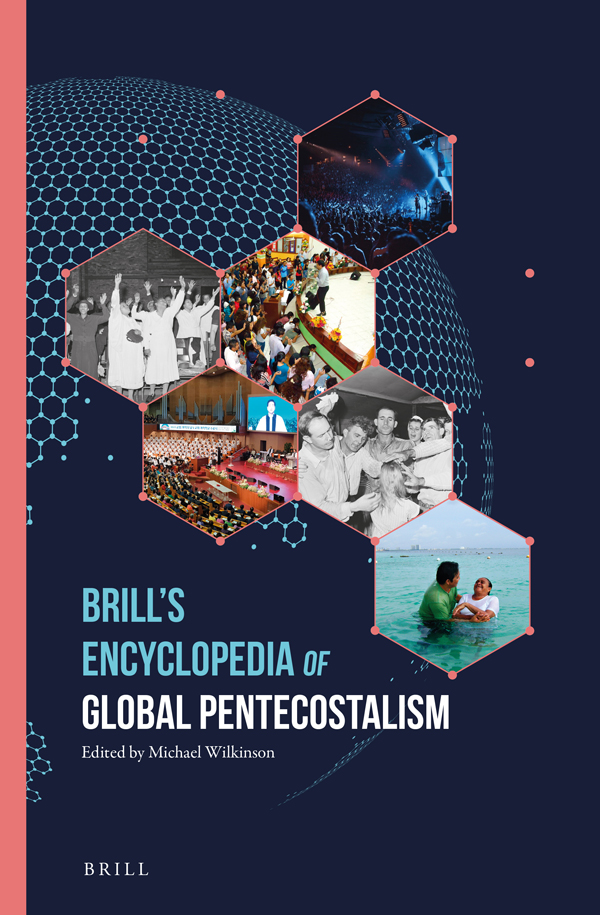
Bulgaria set for third election this year in November
Protest party ITN edged out the conservative GERB in the latest vote, but was not able to form a government. Bulgarian President Rumen Radev will also be running for reelection. Bulgaria will hold its third parliamentary election since April on November 14, President Rumen Radev announced Saturday. Following months of deadlock, Bulgarians are set to once again choose a new parliament after neither of the three largest parties was able to secure a majority government after an election in July. On Saturday, Radev announced that presidential elections will be held on the same day to save money. He is hoping to secure his second term in November.
President Biden delivers remarks at Bulgaria’s Three Sea’s initiative, which aims to reinforce ties between countries along the borders of the Baltic, Adriatic, and Black Seas.
Who is predicted to win?
Protest party ITN, that emerged from mass demonstrations against corruption in 2020, won the July election but was not able to secure a majority in parliament.
 Anti-corruption protests in the summer of 2020 led to the creation of a protest led by an entertainer
Anti-corruption protests in the summer of 2020 led to the creation of a protest led by an entertainer
The latest polls indicate a similarly inconclusive race ahead of the November election.
The pro-EU, centre-right party Citizens for European Development of Bulgaria (GERB) is now leading in a Politico poll by 23% with ITN on 20% support.
In contrast, the leftwing alliance, led by the Socialist Party, is trailing the top two with 16% of the popular support, according to the poll. It achieved 13.2% of the vote at last July’s parliamentary elections.
The split sets the scene for more political instability amid the COVID-19 economic crisis and Bulgaria’s desire to enter the eurozone in 2024.
What of the presidential elections?
President Radev is an independent who is widely considered one of the most popular politicians in Bulgaria. He is tipped to win a second term in office.
While the Bulgarian president’s powers are largely ceremonial, he can also propose legislation and force new votes in parliament by vetoing policy.
“I will count on the support of all respectable Bulgarians on the big issues – the fight against poverty and injustice,” said Radev.
Government Elections in Bulgaria (2005-2019):
2005 Parliamentary Elections
2006 Presidential Elections
2007 Municipal Elections
2009 Parliamentary Elections
2009 European Parliament elections
2011 Presidential Elections
2011 Local Elections
2013 Early parliamentary elections
2014 Early Parliamentary Elections
2015 Municipal Elections
2016 Presidential election
2017 Parliamentary elections
2019 European Parliament election (23-26 May)
2019 Bulgarian local elections
2019 Municipal Elections


